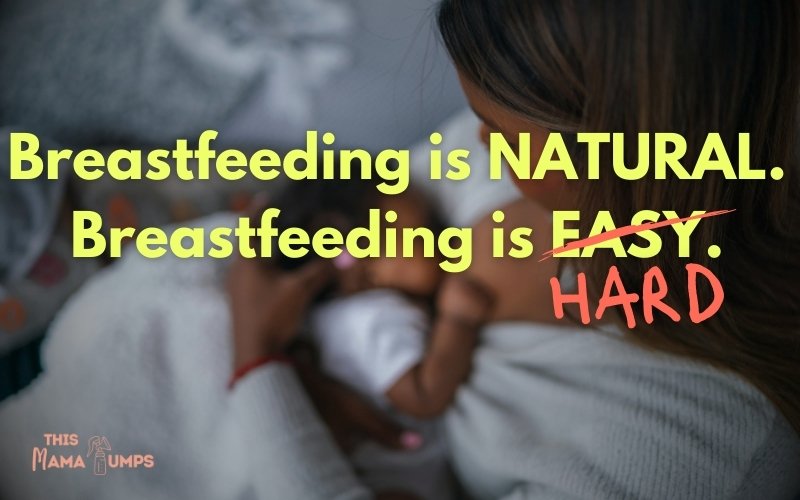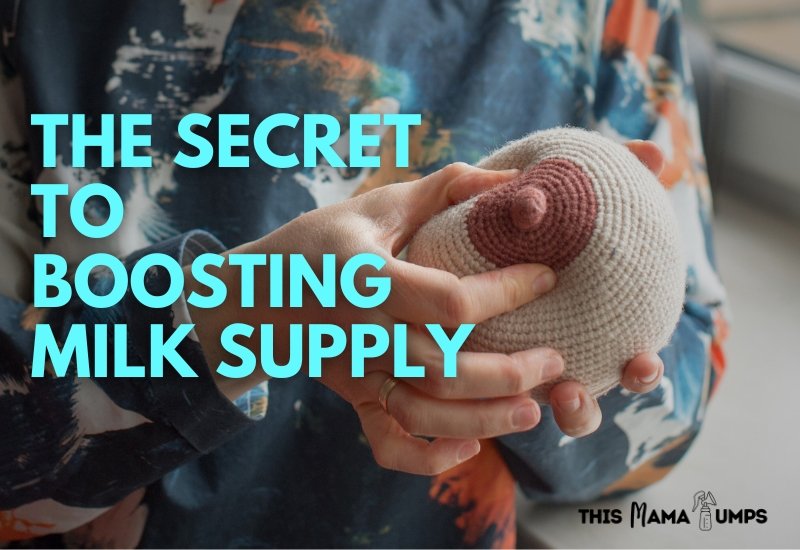Most breastfeeding moms worry about their breastmilk supply.
Who doesn’t?
You can eat lactation cookies, take milk-boosting supplements, and drink lactation teas..
You can load up on Body Armor, Starbucks Pink Drink or any of the latest craze in the breastfeeding world.
But if you don’t do this ONE thing, it will be all for nothing.
So what’s the secret?
Frequent pumping or nursing.
Read on to learn more.
The Law of Supply and Demand
Supply and Demand isn’t just limited to economics.
It also applies to making milk.
Simply put, the more you empty* your breasts, the more milk you’ll make. [1]
Yes, it’s that simple.
We’ve got it backwards
Do you ever get the feeling that your breastmilk supply is somehow your fault?
Perhaps you’ve told yourself these things:
- “My baby falls asleep at the breast. Maybe she’s not getting enough milk.”
- “My baby still cries after nursing for one hour. I think I don’t have enough milk.”
- “I just fed her less than an hour ago and now she wants the boob again! Maybe I don’t have enough milk.”
First, let’s set aside “cluster feeding” behavior (which often happens during growth spurts) and the need for babies to “comfort nurse” (a.k.a., using your boobs as pacifier).
Both are NOT an indicator of low milk supply, anyway. They’re just normal, expected behavior in infants.
So what’s left?
It’s your baby’s ability to latch and drain the milk from your breasts.
Your body is NOT failing you.
No, it’s NOT your fault for not having ENOUGH MILK.
Your milk-making capacity is limited to how often milk leaves the milk-making cells in your boob.
“Effective milk removal” – that’s the term you’ll find research studies. It’s also used by breastfeeding doctors and lactation professionals.
Efficient and effective milk removal affects prolactin and hormonal processes necessary for your breasts to continue making milk. [2]

It’s NOT your baby’s fault either.
I’m not saying it’s your baby’s fault, either.
But it’s usually because of a poor latch, the baby won’t latch, or the baby can’t effectively suck.
There are various reasons for this.
If your baby has difficulty latching or you’re concerned if he/she is not getting enough milk, it’s best to see a lactation consultant who can give you personalized advice.
While you’re working out a latching issue, it’s best to start pumping.
Using a hand pump will do.
Sure, using a manual breast pump can be tiring. But it’s a good thing to keep on hand while baby is still learning to breastfeed.
Do babies really need to learn how to breastfeed?
Yes, breastfeeding is a skill that needs to be learned.
Some babies get it almost immediately.
Most babies, though, need time to learn how to breastfeed. Whether that’s a week or a month, it still takes time.
Take note, this is for healthy, full-term babies.
If your baby is preterm, late preterm, or early term (basically, born less than 39 weeks), expect to encounter more challenges.
This is because the baby’s anatomy is not yet fully developed. [3]
What’s not yet fully developed?
The muscles and the rest of the hardware needed to effectively suck.
Let me tell you a story
My baby was born at exactly 37 weeks. And she was really small – only 2.2kg!
I had an induced labor and emergency C-section.
That time, I didn’t know that both can actually DELAY milk production.
I felt such a failure that my body was not producing milk for my baby.
What’s worst, the pediatrician and nurses touched my boobs, felt they were BIG and FULL, and told me I had “a LOT of milk” (which gave me false hope and unrealistic expectations). They all said, I just need to pump since baby won’t latch.
With one nipple flat and the other inverted, I blamed my nipples for why my baby can’t latch.
A nurse at the nursery where they kept my baby advised me to use a syringe.
That’s what I used to draw my nipples out.
But still, my baby can’t latch.
It took nearly a week for my milk to “come in”.
My baby’s pediatrician already prescribed a special formula (meant for premature infants) while we were at the hospital. She wasn’t really premature. But she had low birth weight.
That time, my sister-in-law was giving us her breastmilk. She collected letdown using the Haakaa while feeding her baby on the other boob.
I was really grateful for that.
I can’t remember how much hand expression, breast massage, and hot compress I did. Probably countless!
And then suddenly, I could pump milk. A little bit at first.
But eventually, I could pump 1-2 oz. per session. The more I pump, the more milk I make.
I didn’t know about exclusively pumping back then.
In hindsight, as soon as I noticed that baby couldn’t latch, I should have just pumped.
I should’ve pumped EVERY TIME my newborn baby asked for a feed. (We rotated giving her formula, donor breastmilk, and my own pumped milk).
No matter how much lactation tea I drank, lactation cookies I ate..
No matter how much I spent on trying different Legendairy Milk supplements..
It didn’t matter.
What mattered was how frequently I pumped.
Breastfeed often
Baby or Pump?
Either or both.
As long as you empty* your breasts frequently.
How Frequent?
Breastfeed on demand.
If you’re exclusively pumping, pump for at least 15 minutes every 2-3 hours.
Some women need to pump much longer (20-30 mins. or more).
Experiment until you find what works for you.
Take note, I use the “empty” here to mean “draining”. In reality, lactating breasts are never completely empty of milk. [1]
A Word on Galactagogues
Galactagogues work. In varying degrees. [4]
But these foods, herbs, and drinks won’t do much if you don’t drain your breasts well.
Why is that?
You might make more milk in the next couple of sessions. But in the long run, your body slows down milk production if you don’t nurse or pump frequently.
Do What Works For You
If drinking Moringa or taking a supplement works for you, that’s okay. Sometimes, we all need a bit of a push.
The MAIN POINT I’m making here is to make sure you don’t forget the basics.
If you’re already breastfeeding frequently but still feel like you’re not producing enough milk, then go ahead and try these food, drinks and herbs to help increase your milk supply.
For more personalized help specific to your situation, consult a lactation professional.
Let Me Know What You Think
I’d love to hear from you! If you have questions, comments or suggestions, leave a comment below.
References:
- Brodribb W. (2018). ABM Clinical Protocol #9: Use of Galactogogues in Initiating or Augmenting Maternal Milk Production, Second Revision 2018. Breastfeeding medicine : the official journal of the Academy of Breastfeeding Medicine, 13(5), 307–314. https://doi.org/10.1089/bfm.2018.29092.wjb
- Krebs, N. F., Belfort, M. B., Meier, P. P., Mennella, J. A., O’Connor, D. L., Taylor, S. N., & Raiten, D. J. (2023). Infant factors that impact the ecology of human milk secretion and composition-a report from “Breastmilk Ecology: Genesis of Infant Nutrition (BEGIN)” Working Group 3. The American journal of clinical nutrition, 117 Suppl 1(Suppl 1), S43–S60. https://doi.org/10.1016/j.ajcnut.2023.01.021
- Zukova, S., Krumina, V., & Buceniece, J. (2021). Breastfeeding preterm born infant: Chance and challenge. International journal of pediatrics & adolescent medicine, 8(2), 94–97. https://doi.org/10.1016/j.ijpam.2020.02.003
- Ryan, R. A., Hepworth, A. D., Lyndon, A., & Bihuniak, J. D. (2023). Use of Galactagogues to Increase Milk Production Among Breastfeeding Mothers in the United States: A Descriptive Study. Journal of the Academy of Nutrition and Dietetics, 123(9), 1329–1339. https://doi.org/10.1016/j.jand.2023.05.019

